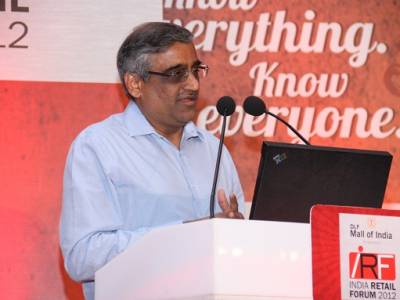IRF 2012: Sets high expectations for the future
Indian consumers are growing increasingly demanding which found retailers of the nation in introspection as they endeavor to leverage on their strengths, maximize their opportunities and formulate strategies when faced with challenges. The second half of Day 2 at IRF 2012 held at Renaissance, Powai, Mumbai saw retailers and stakeholders deliberate and discuss at length about the business and where it is headed in the coming years considering the mercurial times.
The session ‘The Opportunity in Tier 2 and Tier 3 ‘saw a panel of retailers who had considerable experience in these markets and they shared their valuable insight with the audience. Sandeep Ahuja, MD, VLCC shared from his time in these markets and said, “In tier 2 and tier 3 cities the retailers need to focus extensively on service quality and unlike metros where people here everyone knows everyone and relationship management is crucial in these cities to gain customer loyalty.” Sundeep Malhotra, CEO, Homeshop 18 added reliable inputs when he said, “In metros consumers are more price sensitive whereas in the tier 2 and tier 3 cities, since the choices available are less, price does not make a difference to the consumers if the product is of good quality. Also because of the less choices available in these cities, chances of building long lasting relationship with the consumers are easier through providing good service.”
In their tryst for opportunities the retailers found themselves deliberating over the future in the session ‘LinkedIN to Facebook : How to get the best out of social media for your retail business’ which began with Mahesh Murthy, Founder, Pinstorm’s address where he spoke of the importance of social media, its short shelf life, Facebook’s peak which may soon decline and the unpredictable future of the various mediums. Illustrating on his point Elin Kilicarslan, Co founder, SME Rebuilders, UAE said, “If a certain medium can harm your brand rather than help your brand it requires you to make a good foundation.” Bhuvan Gaurav, Head Retail Tanishq was in agreement with her as he spoke of the vitals which is make your content relevant, don’t tire by too frequent posts and strategies must be ‘content based’ not ‘likes based’.
The frontline focus was a session that saluted the frontline team who are the real heroes of the trade as they discussed critical factors that determine retail success. At this session moderated by B. S. Nagesh, Founder TRRAIN and Chairman, RAI saw the frontline managers share their experiences and according to Mr. Nagesh empathizing with our employees is very important, as this helps keep associates happy and this will make a difference to the retail industry. He went on to assert the need to express gratitude to them which heightens their happiness. According to the associates when a customer is happy it is a reward for them. Vishal Nandu from Sarvodaya Stores related his incident illustrating the same when he managed to control shrinkages by investing in his employees by way of sending them to vipasana due to which there’s a sense of belongingness which mitigates the adverse effects.
Retail is a people centric business and while companies and competition are discussed extensively at the heart of the business lies customers and the session ‘How to WoW!-Winning Customers’ was a session close to the heart of the retailers. Sandeep Kulhali, VP Retail and Marketing, Tanishq, Titan Industries expressed the need for understanding the customer as he said, “Efforts are not for business but the results ultimately come to the business. We should reach out to the customers on the personal occasions, post purchase gifting on special occasions, personalized offers and gifting. The companies need to go an extra mile, go beyond the call of duty.”
While Kanan Gopalkrishnan, Director Retail, Nokia brought a new angle to the table, “If the customer makes an effort to come back to you with a complaint or a feedback you should appreciate it that he took the time to get back to you.” The refreshing discussion can easily be summed up in Sandeep Kataria, Chief Marketing Officer, Yum! Restaurants’ when he made the statement, “Start with the basics right and then add the wow.”
Luxury retail is an emerging market that is formulating its own strategies and creating a niche for itself in the minds of Indian global citizens and in the session ‘Reaching Luxury Consumers’ the business practices of the retailers from their marketing to operation strategies were discussed at length. Sukanya Dutta Roy, Director Swarovski, says, “We were selling sparkles and crystals initially. In that process we created a niche category and added sparkle to the lives of people. We were true to the brand; we had consistency and hence created an emotional content.”
This session moderated by senior Business Journalist and TV Anchor Manvi Dhillon focused on understanding the sentiments of the consumer. Top leaders from various retail giants shared their views on consumerism and the latest trends in the Indian retail market. Rajat Tuli, Founder, Happily Unmarried, gave a new perspective when he said, "In India, every retail outlet is family oriented and nothing for singles, we wanted to change that. At Happily unmarried we always try to do something different and unconventional." The insightful session explored the unique relationship between culture and brands and how it can be leveraged to create a meaningful and emotional engagement with the customers. Mohit Kampani, Chief Operations & Merchandising, Spencers Retail further illustrated stating, "The layout of your store is very important. it should reflect the culture and lifestyle of the local community."Consumer choice depends on variety of factors including the price, brand recall and period of association with the brand. There is very less data available in India to understand the consumer behavior which makes it very important for research teams to collect data on consumer behavior. In conclusion Vineet Gautam, Country Head, Bestseller can be quoted, "A lot of times looking at data and trends really doesn't work, you have to dive into the market and evaluate it yourself to understand the consumer."
Retail industry is an industry where dynamics change rapidly and to persistently succeed one must not be adaptable but also constantly re-invent oneself and this was discussed during’ The Art of Reinventing your Business-How to develop strategies that meet the challenges of the future.’ Case studies were discussed where leader with their business acumen and foresight were able to steer the ship of the organization towards success even in difficult times. One such example was that of Dominos India where Ajay Kaul CEO while sharing his experiences in this avenue said, “Challenge the business model, look at affordability by offering product of good quality at affordable price, focus on brand building even during the downturn, focus on the service offered, create a dedicated supply chain, add an emotional touch to the brand journey and have a vision for the entire team.”
In a people centric industry like retail perhaps the most important session is ‘Building People, building businesses : How HR affects the bottom line of a retail business’ where we understand that the business is not simply about building empires but it is about building people. The goals of the company must quintessentially meet the needs of the employees as they are the people who build the business.
The second day came to an end with a mind boggling debate on the elusive question of mall location both from the retailer and the mall owner’s point of view. Four teams comprising of retailers, developers and consultants presented plans and put forward their expectations. Amit Bagaria, Chairman, AISPAC took the bull by its horns when he said, “If you pay peanuts, you get monkeys; so decide if you pay less the sales will be lesser.” Ravi Pahuja from Chokola had an interesting take when comparing malls as he said, “The differentiating factors are the management and the marketing strategies used in a mall. Two malls may be next to each other and have similar tenant mix and yet one may be a failure.” While the mall owners like Ashwin Puri, Pioneer Property Zone agreed when he said, “Retailers are going beyond the locations, and they want to explore new locations. Retailers want to know about the intentions of the developers, of the potential footfalls etc.” The healthy discussion unearthed new ideas and helped the teams get a broader view of the scenario.
Marketing
MINUTES TO READ










Share
Facebook
YouTube
Tweet
Twitter
LinkedIn